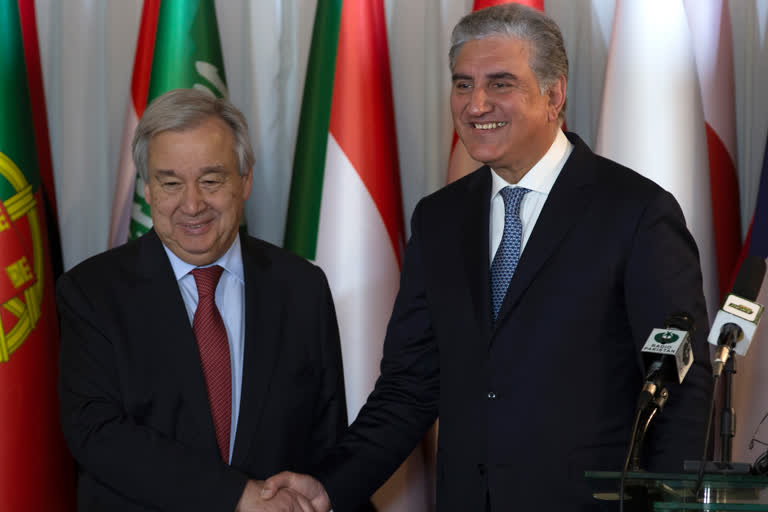Islamabad: UN chief Antonio Guterres on Sunday said that it was important for India and Pakistan to de-escalate "militarily and verbally" and exercise "maximum restraint" as he began his four-day visit to the country, amid tense relations between the two nuclear-armed neighbours.
Addressing a press conference after his meeting with Pakistan Foreign Minister Shah Mahmood Qureshi, the UN Secretary-General said that he was "deeply concerned" over the situation in Jammu and Kashmir and tensions along the Line of Control.
Read also: Pakistan desperate to push terrorists as Army foiled most of infiltration attempts: Army Chief
The UN chief on Sunday arrived on a four-day visit to Pakistan during which he will attend an international conference on Afghan refugees and visit Gurdwara Kartarpur Sahib.
"Diplomacy and dialogue remain the only tools that guarantee peace and stability with solutions in accordance with the Charter of United Nations and resolutions of the Security Council," Guterres told reporters.
Read also: UN chief on first official visit to Pakistan
He emphasised the importance to "de-escalate, both militarily and verbally" while talking about relations between Pakistan and India.
Guterres said that he had "repeatedly stressed the importance of exercising maximum restraint".
"I offered my good offices from the beginning. I am ready to help if both countries agree for mediation," he said.
Tensions between India and Pakistan spiked after New Delhi abrogated the special status of Jammu and Kashmir on August 5 last year. India's decision evoked strong reactions from Pakistan, which downgraded its diplomatic ties and expelled the Indian envoy.
India has defended its move, saying the special status provisions only gave rise to terrorism in Jammu and Kashmir.
"The country took the decision of abrogation of Article 370, which had only given separatism and terrorism to that state," Prime Minister Narendra Modi said in October last year.
The UN chief said that the issue of Kashmir should be resolved according to UN resolution.
"UN Military Observers Group in India and Pakistan (UNMOGIP) should be given free access. It is already there on the Pakistan side, and it should also be given on the other side," he said.
"We have taken a position that UN resolutions (on Kashmir) should be implemented, there should be ceasefire (on LoC) and human rights should be respected," he said.
New Delhi maintains that UNMOGIP has outlived its utility and is irrelevant after the Simla Agreement and the consequent establishment of the LoC.
India has rejected any third-party intervention to the Kashmir issue and maintained that all outstanding matters in Indo-Pak ties should be resolved bilaterally.
In August last year, Prime Minister Modi categorically rejected any scope for third party mediation on Kashmir, saying it was a bilateral issue between India and Pakistan, and "we don't want to bother any third country".
Calling the Kartarpur initiative a "symbol of interfaith harmony, a unique experiment in cross-border ties", the UN chief said that the opening of the corridor showed "Pakistan's commitment to peace".
Guterres said that one of the main purposes of his visit was to "spotlight the real Pakistan, with all its possibilities and potential."
Qureshi in his remarks said that he briefed Guterres on the "challenging situation" after India revoked the special status of Kashmir.
He also demanded that the UN human rights commissioner should come up with a report on the post-August 5 situation in Kashmir.
With inputs from PTI



